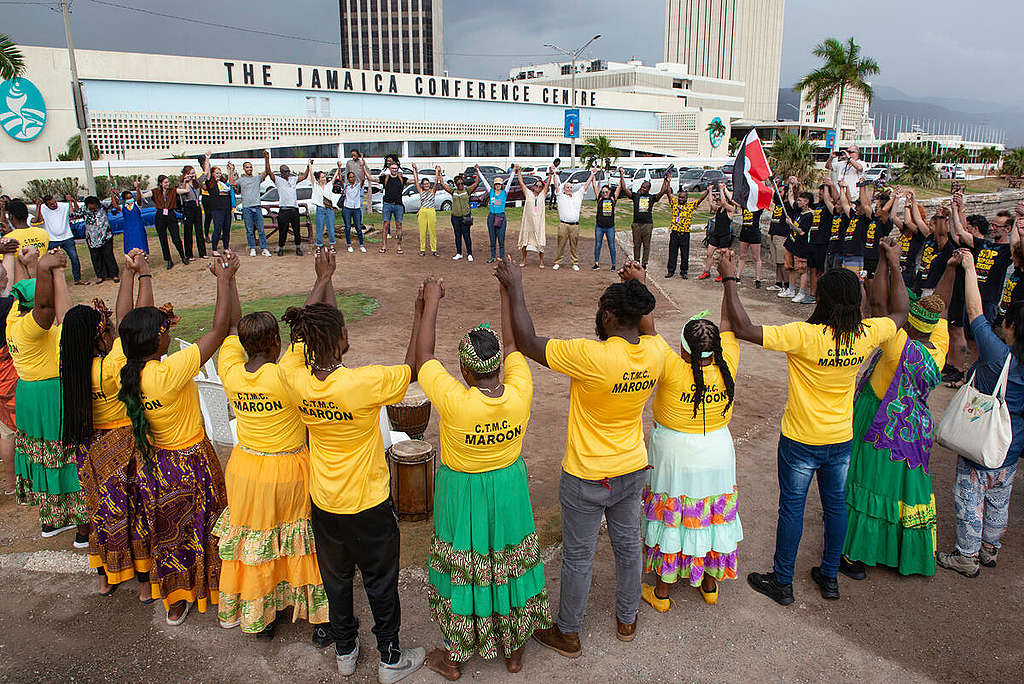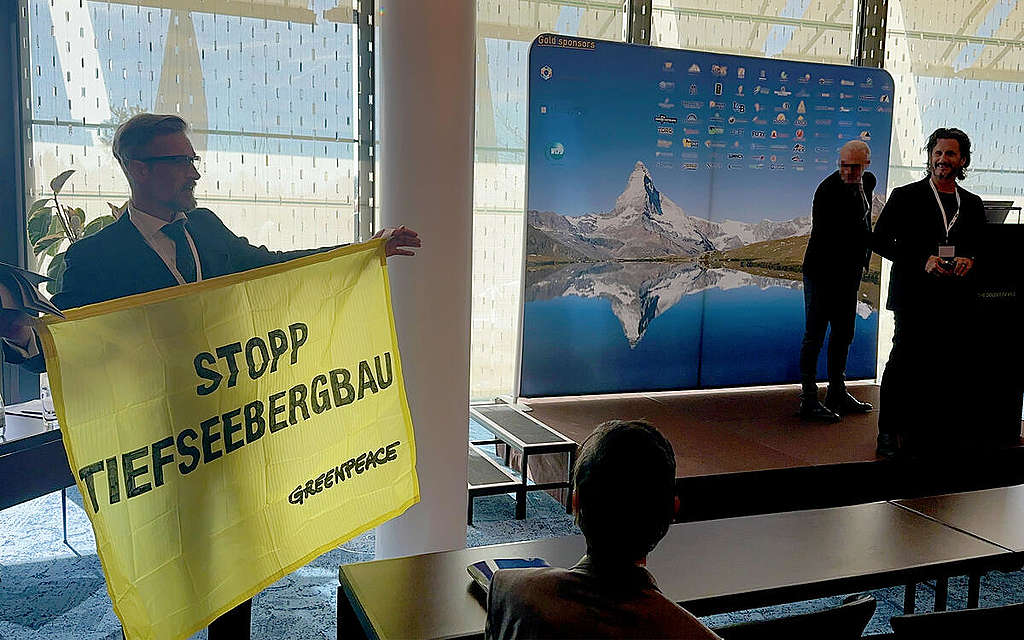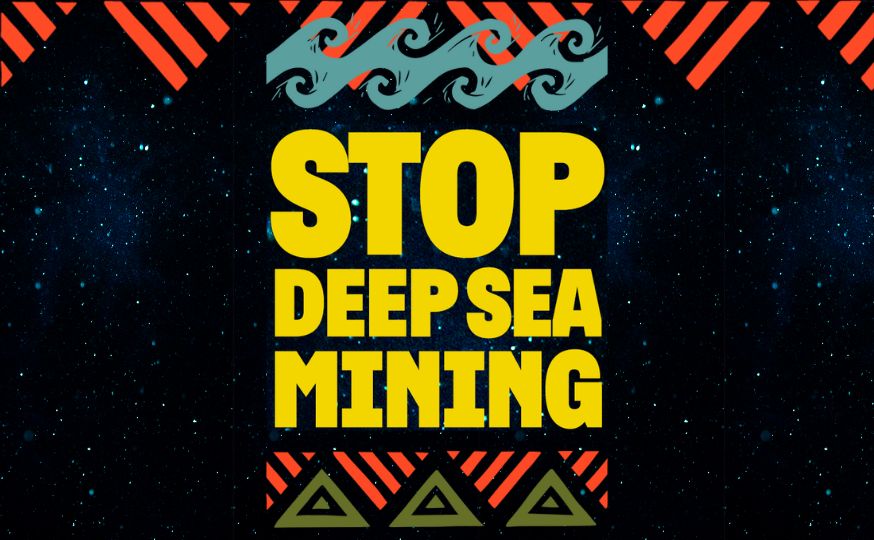The world is waking up to the significance of the threat from deep sea mining, but governments have squandered a major opportunity to take action at the 28th Session of the International Seabed Authority (ISA). Even after two weeks of negotiation, they failed to reach an agreement to put a clear stop to deep sea mining.
With no agreed plan to stop the deep sea mining industry from starting this year, the door is left open for the industry to mine the seabed. And that’s unacceptable!
The past two weeks have seen Indigenous advocates reject deep sea mining, scientific warnings of the risks grow ever stronger, and the longest-standing and biggest corporate backer of the industry call it quits. Despite such clear messages, the negotiations at the Council of the ISA failed to yield concrete results, notably on the most pressing topic at hand: how to ensure that deep sea mining can not be authorized some time soon after July 2023.
During these talks in Kingston, Jamaica, a growing number of countries made statements in favor of a moratorium or a precautionary pause on deep sea mining, but the members of the Council failed to agree on any meaningful way to prevent the deep sea mining industry from exploiting legal loopholes to start mining soon in the international seabed area. Rather, they only agreed to continue to discuss the topic in the build-up to the next meeting of the ISA Council in July. To add to existing concerns about the lack of transparency at the ISA, the discussion on how to proceed took place in meetings closed to observers like Greenpeace International.
Unless Governments get their act together between now and the next Council session in July, the very real danger exists that The Metals Company’s subsidiary, Nauru Ocean Resources Incorporation (NORI), applies for a license to start deep sea mining in the Pacific Ocean, potentially destroying priceless marine ecosystems, and with little to no oversight.
Global mobilization is growing
From Australia and New Zealand, to the United States, in Belgium, France or in Kingston, Jamaica, global awareness about deep sea mining is growing. Throughout the ISA meeting, people mobilized online and on the streets around the world.
This kicked-off in Kingston with a fantastic welcoming event organized by a Jamaican youth organization, to welcome the Arctic Sunrise and her crew in Jamaica, which includes part of the Greenpeace delegation and Indigenous Peoples from the Pacific campaigning against deep sea mining. This session was the opportunity for activists from the Pacific to have their voices heard as the first impacted communities. The impacts of mining the deep sea could seriously affect the fish populations that provide food and livelihoods for many Pacific communities. For too long, Indigenous peoples have been pushed aside in the name of extractive industries.
The right for Pacific peoples to forge their own destiny has often been taken away by Global North governments and corporate interests. Deep sea mining is just the latest form of neo-colonialism, exploiting Pacific land and seas, without adequate regard to Pacific peoples’ way of life, food sources and spiritual connection to the ocean. But now, in Kingston, they stood up in resistance, making their point directly to decision makers, and taking action to stop history repeating itself.
 Kingston, Jamaica – The 28th Session of the International Seabed Authority starts on 16th March with world delegates gathering in Kingston, Jamaica less than two weeks after the Global Ocean Treaty was agreed at the United Nations. The meeting is a critical moment for the future of the oceans as deep sea mining companies are rushing the start of this risky industry. © Martin Katz / Greenpeace
Kingston, Jamaica – The 28th Session of the International Seabed Authority starts on 16th March with world delegates gathering in Kingston, Jamaica less than two weeks after the Global Ocean Treaty was agreed at the United Nations. The meeting is a critical moment for the future of the oceans as deep sea mining companies are rushing the start of this risky industry. © Martin Katz / GreenpeaceMeanwhile, in Zurich, activists from Greenpeace Switzerland interrupted a deep sea mining investors’ meeting, where Gerard Barron, The Metals Company’s CEO, was giving a speech, to highlight the risks of deep sea mining.
The Metals Company (TMC) is a Canadian mining company and one of the most ruthless when it comes to plundering the seabed. In a bid that aims to put pressure on delegates at the ISA and rush the start of deep sea mining, TMC worked with their sponsoring state to trigger a controversial loophole called the “2 year rule” that sets an ultimatum for governments. The industry is trying to use this as a deadline for governments to allow deep sea mining to start in July.
 Greenpeace activists protest against deep-sea mining at an international investor meeting in Zurich. At the meeting at The Dolder Grand Hotel, the Canadian company “The Metals Company” solicited new investors. © Greenpeace
Greenpeace activists protest against deep-sea mining at an international investor meeting in Zurich. At the meeting at The Dolder Grand Hotel, the Canadian company “The Metals Company” solicited new investors. © GreenpeaceWe need to keep up the pressure
This is also why Greenpeace International took action, alongside activists from the Pacific, against a research expedition paving the way for development of the deep sea mining industry.
Let’s face it: the outcomes of this meeting are unacceptable. Governments have left the door open to mining starting this year. This is a rude awakening after the adoption of the Global Ocean Treaty. What are they doing? What else do they need to take a firm and clear decision to prevent deep sea mining monster machines to destroy fragile ecosystems? This industry is not waiting, nor should the governments.
It’s not too late. Alongside activists from the Pacific, together, we can win and you can join us.

We need a global moratorium to stop the launch of this destructive new extractive industry. Join the Campaign now.
Maud Oyonarte is the global digital lead for the Greenpeace International Stop Deep Sea Mining campaign, based in Paris, France.
Sebastian Losada is an oceans policy adviser at Greenpeace International and was a member of the Greenpeace delegation at the ISA 28th Session. He is based A Coruña, Spain.

 1 year ago
81
1 year ago
81
 ACTION – While governments are discussing whether to allow deep sea mining or not, the industry is moving ahead regardless. We are taking action at sea to say NO to deep sea mining.
ACTION – While governments are discussing whether to allow deep sea mining or not, the industry is moving ahead regardless. We are taking action at sea to say NO to deep sea mining. 
